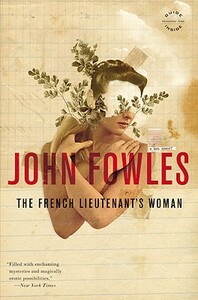You need to sign in or sign up before continuing.
Take a photo of a barcode or cover
Una dintre cărțile preferate din toate timpurile - am vorbit mai mult despre ea pe canalul meu de YouTube, aici :)
I thought the actually narrative of the story was actually really enjoyable, but the narrators constant interruptions which seemingly added nothing hindered the book from being as good as it could be.
challenging
emotional
reflective
slow-paced
Plot or Character Driven:
Character
Strong character development:
Yes
Loveable characters:
Complicated
Diverse cast of characters:
No
Flaws of characters a main focus:
Yes
Brilliant and damaging. A book that teaches the reader never to invest themsevles to much in the characters.
reflective
sad
slow-paced
Plot or Character Driven:
Character
Strong character development:
Yes
Loveable characters:
Complicated
Diverse cast of characters:
No
Flaws of characters a main focus:
Yes
May be mildly spoilery.
Set in Lyme Regis in 1867, boy is engaged to girl but meets The French Lieutenant's Woman. Boy is tired of social conventions, duties, facades (embodied by his fiancé), is drawn to the natural (he collects fossils and is a Darwinian), the direct, the freedom to live one's life as one chooses not as one is expected to (embodied by Sarah, the title character). I thought I saw where this was going. I wasn't.
John Fowles kept surprising me, right up until the final page. I'm not sure I like Sarah. I can't figure her out, which I'm sure is his intent. Is she lying? Is dr. Grogan right and she is wallowing in melancholia and self-pity and a need to possess and destroy others? Is she a suffragette trying to live life on her own terms no matter the consequences? Does she have a plan? Is she cruel and cold-hearted? Was Charles fooling himself, wanting her to be Freedom From Convention when in fact she was just selfish? What had happened if Sam had delivered the letter and packet as instructed?
Charles is lying, mostly to himself. He lies about why he wants to keep meeting Sarah, he lies about his feelings for her and Ernestina. Would he even if he had never met Sarah? Was he so hooked on the idea of Freedom and being true to oneself, to break free from social conventions and duties, that he made light of the consequences of burning one's bridges? Did he know himself any better than he knew Sarah?
Fowles is himself an active character in the book, taking us behind the scenes of creating a novel. He sometimes addresses us, the readers, directly like this: (not direct quotes) "I want my character to do this, but he wants something else now. What should I do?" or "the job of the novelist is to make the characters fight and then we decide who wins. We fix the match, but without making it seem so - it has to flow organically." He wrote the book in the 1960s and he comments on the Victorian era as seen from his present. And he comments on a wide variety of subjects, from sex among poor field labours in rural England, to religion and atheism, Darwin and science, mental illnesses, working in trade, social mobility, understanding different dialects in a time without radio and tv, etc. It is as if he thought: "I've read a lot of poems, reports, articles etc. about the Victorians and I have a lot to say about them vs. us. I'll write a story and put in my thoughts about the times along the way." And he did it brilliantly and with warmth, humour and understanding.
I've never read a book like this with a narrator like this. It's unique, fascinating and unputdownable.
Also, I didn't know that Thomas Hardy almost married his illegitimate sister's illegitimate daughter!
Set in Lyme Regis in 1867, boy is engaged to girl but meets The French Lieutenant's Woman. Boy is tired of social conventions, duties, facades (embodied by his fiancé), is drawn to the natural (he collects fossils and is a Darwinian), the direct, the freedom to live one's life as one chooses not as one is expected to (embodied by Sarah, the title character). I thought I saw where this was going. I wasn't.
John Fowles kept surprising me, right up until the final page. I'm not sure I like Sarah. I can't figure her out, which I'm sure is his intent. Is she lying? Is dr. Grogan right and she is wallowing in melancholia and self-pity and a need to possess and destroy others? Is she a suffragette trying to live life on her own terms no matter the consequences? Does she have a plan? Is she cruel and cold-hearted? Was Charles fooling himself, wanting her to be Freedom From Convention when in fact she was just selfish? What had happened if Sam had delivered the letter and packet as instructed?
Charles is lying, mostly to himself. He lies about why he wants to keep meeting Sarah, he lies about his feelings for her and Ernestina. Would he
Spoiler
have broken his engagement to ErnestinaFowles is himself an active character in the book, taking us behind the scenes of creating a novel. He sometimes addresses us, the readers, directly like this: (not direct quotes) "I want my character to do this, but he wants something else now. What should I do?" or "the job of the novelist is to make the characters fight and then we decide who wins. We fix the match, but without making it seem so - it has to flow organically." He wrote the book in the 1960s and he comments on the Victorian era as seen from his present. And he comments on a wide variety of subjects, from sex among poor field labours in rural England, to religion and atheism, Darwin and science, mental illnesses, working in trade, social mobility, understanding different dialects in a time without radio and tv, etc. It is as if he thought: "I've read a lot of poems, reports, articles etc. about the Victorians and I have a lot to say about them vs. us. I'll write a story and put in my thoughts about the times along the way." And he did it brilliantly and with warmth, humour and understanding.
I've never read a book like this with a narrator like this. It's unique, fascinating and unputdownable.
Also, I didn't know that Thomas Hardy almost married his illegitimate sister's illegitimate daughter!
reflective
medium-paced
Plot or Character Driven:
Character
Strong character development:
Yes
Loveable characters:
Complicated
Diverse cast of characters:
No
Flaws of characters a main focus:
Yes




